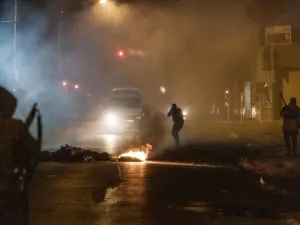If it can prove itself, the Constitutional Court would do a great deal to reestablish confidence in South African democracy and send a clear message to those opposing Mr. Ramaphosa’s cleanup efforts that even those in power are not above the law.
This is what we argued on July 2nd when we discussed Jacob Zuma's 15 month prison sentence for contempt of court. Today, South Africa is seeing the gravity of the court's brave decision. Unfortunately, the ensuing unrest has left over 70 South Africans dead.
After Mr. Zuma turned himself in on July 7th, minor agitation grew in his home district of KwaZulu-Natal. Since then, violence has intensified and spread to more of the country, leading to full-scale riots and widespread looting. South African police were quickly overwhelmed, and the military was deployed to assist in quelling the unrest.
It is unclear what exactly is motivating those in the streets. However, it is unlikely that most of the activity still stems from support for Mr. Zuma, despite his arrest being the animating cause of the initial turbulence. Instead, the agitation has probably snowballed because of South Africa's dire economic situation and other impacts of the pandemic. Unemployment in the country recently reached a high of over 32%—the highest since records were first taken in 2008. By comparison, the highest rate of unemployment experienced in the United States during the Great Depression is estimated to have been around 25%.
President Cyril Ramaphosa has neglected to pin-point a single cause—and reasonably so—but he has blamed everything from this economic crisis to alleged prejudices of the Zulu people against him and in support of Mr. Zuma, who at times emphasized his ethnicity to gin up support. This claim poses a particular danger given that supporters of Mr. Ramaphosa and Zuma's party, the African National Congress (ANC), once engaged in open battle with Zulu supporters of the Inkatha Freedom Party. Today, Mr. Ramaphosa would do well not to dig up old bones and potentially add fuel to largely dormant flames of ethnic tension in the rainbow nation.
Mr. Ramaphosa is right to point out the political motivations which in large part instigated this activity. It may even be possible that the small-scale agitation which began in KwaZulu-Natal was partially staged by members of the ANC who stood most to lose in light of Mr. Ramaphosa's corruption crackdown. In fact, Mr. Zuma's family and foundation voiced support for the activity as it turned to rioting and proclaimed the innocence of the former President.
However, Mr. Ramaphosa may be erring in leaning on a kind of democratic hopefulness in light of Mr. Zuma's imprisonment, as he has in some statements like the one below.
We are emerging now from a long period of uncertainty and stagnation. We have witnessed the effects of corruption and the erosion of the state, the terrible consequences of the abuse of power and neglect of duty.
— Cyril Ramaphosa 🇿🇦 #StaySafe (@CyrilRamaphosa) July 12, 2021
We have begun a process of healing, reconstruction and renewal.
Mr. Ramaphosa is right that the state must not tolerate the kind of corruption and theft committed by Mr. Zuma, if it is to be capable of building a fair society. But it may mean very little to those millions of unemployed South Africans that a corrupt former President is now behind bars. At times of such dire economic crisis as South Africa is currently suffering, rule of law can often seem ornamental or performative: unimportant compared to the real problems on the ground. It is at such times, though, that rule of law is in fact most crucial to prevent bad actors from manipulating the public to gain and abuse excessive power.
It is imperative now that Mr. Ramaphosa does not allow this vital step to be the final step. Now, South Africa must see this progress towards responsible governance followed by positive change from a government less encumbered by parasitic actors like Mr. Zuma and his comrades.


Comments
Join the conversation